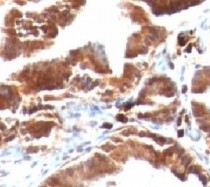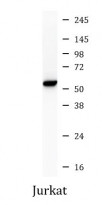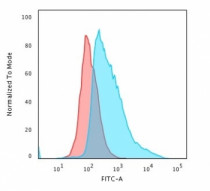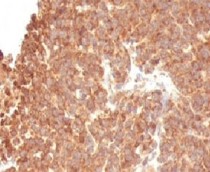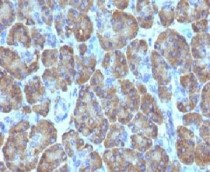ARG56183
anti-TOP1MT antibody [TOP1MT/488]
anti-TOP1MT antibody [TOP1MT/488] for Flow cytometry,IHC-Formalin-fixed paraffin-embedded sections,Western blot and Human
Overview
| Product Description | Mouse Monoclonal antibody [TOP1MT/488] recognizes TOP1MT |
|---|---|
| Tested Reactivity | Hu |
| Tested Application | FACS, IHC-P, WB |
| Host | Mouse |
| Clonality | Monoclonal |
| Clone | TOP1MT/488 |
| Isotype | IgG2b, kappa |
| Target Name | TOP1MT |
| Antigen Species | Human |
| Immunogen | Recombinant full-length human TOP1MT protein. |
| Conjugation | Un-conjugated |
| Alternate Names | TOP1mt; EC 5.99.1.2; DNA topoisomerase I, mitochondrial |
Application Instructions
| Application Suggestion |
|
||||||||
|---|---|---|---|---|---|---|---|---|---|
| Application Note | IHC-P: Antigen Retrieval: Boil tissue section in 10 mM Citrate buffer (pH 6.0) for 10-20 min, followed by cooling at RT for 20 min. * The dilutions indicate recommended starting dilutions and the optimal dilutions or concentrations should be determined by the scientist. |
||||||||
| Positive Control | Jurkat | ||||||||
| Observed Size | ~ 57 kDa |
Properties
| Form | Liquid |
|---|---|
| Purification | Purification with Protein G. |
| Buffer | PBS (pH 7.4), 0.05% Sodium azide and 0.1 mg/ml BSA. |
| Preservative | 0.05% Sodium azide |
| Stabilizer | 0.1 mg/ml BSA |
| Concentration | 0.2 mg/ml |
| Storage Instruction | For continuous use, store undiluted antibody at 2-8°C for up to a week. For long-term storage, aliquot and store at -20°C or below. Storage in frost free freezers is not recommended. Avoid repeated freeze/thaw cycles. Suggest spin the vial prior to opening. The antibody solution should be gently mixed before use. |
| Note | For laboratory research only, not for drug, diagnostic or other use. |
Bioinformation
| Database Links |
Swiss-port # Q969P6 Human DNA topoisomerase I, mitochondrial |
|---|---|
| Gene Symbol | TOP1MT |
| Gene Full Name | topoisomerase (DNA) I, mitochondrial |
| Background | This gene encodes a mitochondrial DNA topoisomerase that plays a role in the modification of DNA topology. The encoded protein is a type IB topoisomerase and catalyzes the transient breaking and rejoining of DNA to relieve tension and DNA supercoiling generated in the mitochondrial genome during replication and transcription. Alternatively spliced transcript variants encoding multiple isoforms have been observed for this gene. [provided by RefSeq, May 2012] |
| Function | Releases the supercoiling and torsional tension of DNA introduced during duplication of mitochondrial DNA by transiently cleaving and rejoining one strand of the DNA duplex. Introduces a single-strand break via transesterification at a target site in duplex DNA. The scissile phosphodiester is attacked by the catalytic tyrosine of the enzyme, resulting in the formation of a DNA-(3'-phosphotyrosyl)-enzyme intermediate and the expulsion of a 5'-OH DNA strand. The free DNA strand then undergoes passage around the unbroken strand thus removing DNA supercoils. Finally, in the religation step, the DNA 5'-OH attacks the covalent intermediate to expel the active-site tyrosine and restore the DNA phosphodiester backbone (By similarity). [UniProt] |
| Cellular Localization | Cytoplasmic (mitochondria) |
| Calculated MW | 70 kDa |
Images (5) Click the Picture to Zoom In
-
ARG56183 anti-TOP1MT antibody [TOP1MT/488] IHC-P image
Immunohistochemistry: Formalin-fixed and paraffin-embedded Human gallbladder stained with ARG56183 anti-TOP1MT antibody [TOP1MT/488].
-
ARG56183 anti-TOP1MT antibody [TOP1MT/488] WB image
Western blot: Jurkat cell lysate stained with ARG56183 anti-TOP1MT antibody [TOP1MT/488].
-
ARG56183 anti-TOP1MT antibody [TOP1MT/488] FACS image
Flow Cytometry: PFA-fixed MCF7 cells stained with ARG56183 anti-TOP1MT antibody [TOP1MT/488] (blue); Isotype control (red).
-
ARG56183 anti-TOP1MT antibody [TOP1MT/488] IHC-P image
Immunohistochemistry: Formalin-fixed and paraffin-embedded Human melanoma stained with ARG56183 anti-TOP1MT antibody [TOP1MT/488].
-
ARG56183 anti-TOP1MT antibody [TOP1MT/488] IHC-P image
Immunohistochemistry: Formalin-fixed and paraffin-embedded Human pancreas stained with ARG56183 anti-TOP1MT antibody [TOP1MT/488].
